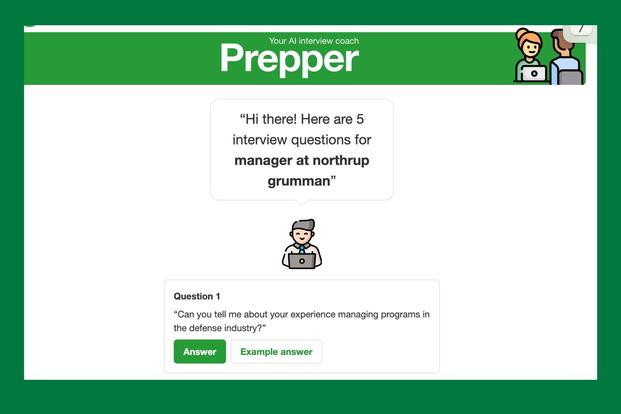You need more power. When you are getting ready to find your first civilian job, you need more than the otherworldly skills you have already mastered in the military. You could use some power from artificial intelligence (AI) to make things a whole lot easier. AI weaponizes your post-military job hunt in some most remarkable ways.
As the transition master coach for Military.com's Veteran Employment Project, I like to think of all of you in military transition like Jedi masters, blasting out into the unknown. (Stay with me here.)
Jedis never seem to go out into the vast unknown without their R2-D2, C-3PO or R5-D4. They need that droid to navigate, translate and open doors. For them, having their own droid is perfectly normal. Like owning a blender.
That is how AI should be when it comes to your post-military job hunt -- an advanced, skilled, somewhat limited helper. While there are pros and cons to using AI on the job hunt, and I have some reservations about how much it can help when writing a resume for the defense industry, these tools can help you an amazing amount -- especially when you kinda hate spelling and grammar.
You don't have to be particularly tech savvy to use these tools. They do not take a lot of time to learn. And even in the early stages of adoption, they boost your results and lower your angst. Here are five ways AI droids can help veterans get a job:
1. Identify Your Career Options
At first, active-duty service members usually do not know what kind of job they want to do after the military. More importantly, they do not know where to begin the search for their next career, outside of trolling the job boards. Shoot, most of the time, they do not know the names of the jobs or departments in the civilian world.
This is where your AI can get you started. You can't ask it about specific job listings in your area, because the tool cannot cross over into another app and it will tell you so.
Start by asking ChatGPT, HIX Chat, YouChat or any of the other recommended AI tools, a simple question like: What kind of job can I get with this kind of experience? Then copy and paste your resume or your Linkedin profile into the chat box.
Based on that information, it will generate a response that gives you a list of jobs at your career level. Most of these tools produce very similar results, but it is a real start. Here is one from ChatGPT:

You can also use the bots on LinkedIn to help you find out what jobs other veterans with your experience were hired to do. Find out how in our Stealth LinkedIn Master Class. Past hiring behavior of the employer is the best predictor of future hiring behavior.
2. Generate Interview Responses to Practice
One of the biggest mistakes I see veterans, military and spouses make on the job hunt is failing to prepare for the interview. And by "prepare," I mean generating responses to interview questions and saying them out loud in front of another person until they feel natural, personal and inviting.
Prepper
That is why I like AI to be your little helper. You can find AI tools like Prepper that are designed exclusively for the interview. They help by offering responses specific to certain jobs, certain companies and certain kinds of interviewers.
The free version of Prepper allows you to input the job title, job description and company, as well as how hard you expect the interview to be: easy, hard or "pirate." Then it generates five free questions. You can look at the suggested answer, or put your own answer in and have it scored. It looks like this:

ChatGPT
Tell a chat tool like ChatGPT: I am interviewing for a job as a (job title). What do I say when they ask (insert an interview question)? Here is the job listing. Then paste the whole job listing.
The bot will give you a response. It will probably be a lot longer than human beings really want to listen to. Bots don't know that, which is why you would want to shape the response yourself.
The advantage here is that they give you the response a hiring manager is going to expect. It is so much easier to adapt this kind of response to your personal experience when you know what the answer should be. Then you can follow up with the next interview question on your list.
If you have started your free LinkedIn Premium subscription for the military, you can also use the LinkedIn interview bot to practice your responses and get real-time feedback. If R2-D2 was listening to this article, he would be whistling and beeping and telling you not to skip this step. It is a terrible feeling to know you talked yourself right out of the job in the interview, because you failed to train.
3. Slap Together a Cover Letter
I am a writer by profession, so I don't really approve of most things that are written by bots. I think they are boring. I especially hate the suggestions that AI should be used to network. My rule is that if the message is intended to go from one real person to another real person, you should have the respect to write it yourself -- flaws and all.
Except for cover letters. I think cover letters are a monumental waste of time in the veteran job hunt. Most veterans agonize over getting them right. Most hiring managers never, ever read them. So I think it is perfectly acceptable for a bot to slap together a cover letter for another bot to read.
4. Auto-Apply to Jobs
I have a Gen Z colleague who is always telling me that applying to jobs en masse is the key to getting all the interviews you want. I'm not crazy about this suggestion, but he might be right for job seekers under 30. This could be good for those who do not have much of a professional network and are looking for an early career job.
Although employers are not crazy about being flooded with resumes and will probably figure out a way to thwart this effort, sometimes a new tool offers a competitive advantage. For the young, AI tools like Simplify Jobs, LazyApply or Massive allow you to apply to hundreds -- even thousands -- of jobs automatically based on your profile. It can help you get in first before the job is closed.
If you are over 30 or looking for a job in leadership or management, skip this suggestion because the research says that the "weak ties" in your network are what you need to get that job.
5. Tea and Sympathy
Looking for a job is one of the loneliest, most disheartening things you can do. Because AI tools scour the internet for the most common advice, they can sometimes come up with a little wisdom when you need it.
If you are feeling discouraged or perplexed, you can ask the chat for a little advice, such as: I have submitted 120 applications and only received one invitation for an interview. What am I doing wrong?
The bot responds with the electronic version of tea and sympathy and uses advice you have heard a thousand times before. It is both equally annoying and reassuring. And it might be just enough to get you to reach out to a real person for the kind of ideas and empathy only humans can produce.
Jacey Eckhart is Military.com's transition master coach. She is a certified professional career coach and military sociologist who helps military members get their first civilian job by offering career-level Master Classes through our Veteran Employment Project and on her website, SeniorMilitaryTransition.com. Reach her at Jacey.Eckhart@Monster.com.
Find Your Next Job Fast
Transitioning military, veterans and spouses may be qualified for the job, but they are missing the secrets of civilian hiring. Find out everything you need to know with our free master class series, including our next class. You can view previous classes in our video library. Questions for Jacey? Visit our Facebook page.







